2018 Linda McEnhill Award winners
Category A: A new development or innovation in care / excellence in overall end of life support for people with learning disabilities
WINNER
St Christopher’s Hospice Learning Disability Care Home Project Team, Sydenham
Nominated by: Julie Kinley (manager)
In a nutshell: Development of a comprehensive programme delivered to 60 learning disabilities care homes within one London borough, aimed at improving access to timely healthcare treatment, appropriate interventions and palliative care
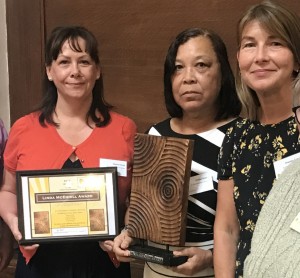
The Care Home Project Team at St Christopher’s Hospice was established in 2008 to improve the quality of end of life care for frail older people in nursing homes, through implementation of the Gold Standard Framework in Care Homes Programme and “Steps to Success” programme. In 2016 a local commissioner wanted to ensure equity of access across all care settings, including residential care homes for people with learning disabilities. The St Christopher’s Learning Disability Care Home Project team was formed, with a brief to implement an end-of-life care programme into all 60 learning disability homes within the borough.
The team undertook a literature review, met with the experts in the field of learning disability /palliative care and care home managers (including previous winners of the Linda McEnhill Award). From this, they concluded that the existing ‘Steps to Success’ Programme needed to be adapted with, and for, a different population. Working with local learning disability care home staff, they developed not an end-of-life care but a palliative care programme where the focus is not on dying but on living well but being proactively prepared for when health deteriorates.
All 60 learning disability homes were approached to take part in this programme, and almost all did so. Its success is due to the use of a structured programme, bringing the care staff together to the workshops enables them to learn and share ideas from each other. The workshops are then followed up by high facilitation from the St Christopher’s Hospice programme leads visiting the homes. To ensure the homes sustain this programme the leads will continue with three monthly support visits.
A Phases of Illness guide for People with a Learning Disability was developed (PIP-LD) as a guide for care staff to recognise changes and decline in a person with a learning disability’s health. It became clear that many care staff had limited knowledge about the physical and mental health needs of those living within the home. For example, the staff reported that a resident had extra fluid in her body. Through using the PIP-LD guide it was identified that this lady had progressive and deteriorating heart failure. Staff had put her symptoms down to ageing. They did not understand how to keep her well, monitor for increasing symptoms and when to report this to the GP. This was a common and recurring problem for all the homes. From participating in this programme the homes now review their residents using the guide as a team every three months. They now have a range of tools such as MY Pain Profile, DisDat and the Glasgow anxiety and depression tool to aid their symptom assessment which they did not previously have. They can now confidently assess their health status, know how to keep the person well in terms of that illness, how to monitor for changes and identify when the person is deteriorating and coming towards the end of life.
Prior to the programme the majority of the care staff within the programme had little to no knowledge about palliative care or the concept of Advance Care Planning. Previously staff where reluctant to talk about death with their residents and families as this was a younger population and fear of upsetting them. They now understand the importance of giving their residents and families the opportunity to discuss this and make choices. Some homes have been truly innovative and have designed their own advance care plans to meet the needs of specific residents.
An extension of this is as staff understand the benefits of effective communication they are sharing information around the phases of illness, diagnosis, advance care planning, with other health care professionals. With Phases of illness and symptom assessment tools they are talking the same language as their health care professionals and communication between services has been enhanced.
Prior to starting this programme care staff believed that when a person with a learning disability deteriorated they would be moved to a nursing home and if very ill they would go to hospital to die. From participating in the programme and as they have gained knowledge and confidence in how to support the resident and the family, they now feel able to manage that person in the home if that is their wish.
Most of the homes have completed the programme, with many completing their portfolios and achieving a ‘Steps to Success’ award. The CQC will review the completed portfolios of evidence as part of their routine inspection,
The judges were very impressed with the thorough evidence-based approach and the comprehensive nature of engaging all learning disabilities homes within one borough. The programme is truly innovative, proactive and responsive to the needs of local people with learning disabilities. It was possible for the participating homes to individualise the programme further and make it their own. Through educating care staff they are now able to recognise changes in a person’s health enabling access to earlier treatment, appropriate interventions and palliative care.
HIGHLY COMMENDED
Sunderland Community Specialist Palliative Care Team
Sunderland Learning Disability Community Treatment Team
Sunderland People First
Nominated by: Dr Lisa Baker (St Benedict’s Hospice, Sunderland)
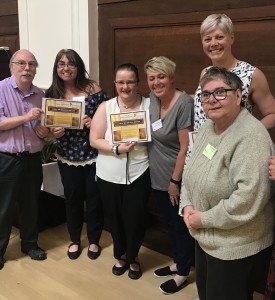
The Community Specialist Palliative Care Team and Learning Disability Community Treatment Team have been working in partnership for several years, developing an agreed pathway of care for people in Sunderland who have palliative care needs and a learning disability. An audit of the effectiveness of their pathway showed dramatic reductions in unplanned hospital admissions. They have teamed up with Sunderland People First, a local advocacy group, to create easy-read resources. The resources is hosted on their website: https://www.sunderlandactionforhealth.co.uk/professional-resources/specialist-services/specialist-services/
The judges felt that this was a dedicated multidisciplinary team with a real can-do attitude, who have worked across boundaries and involved local people with learning disabilities, leading to demonstrable improvements in care.
HIGHLY COMMENDED
Centre 404 & Gentle Dusk
Nominated by: Debbie Young (Training Lead at Gentle Dusk)
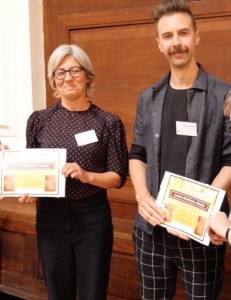
Centre 404 is a learning disability service provider, supporting people with learning disabilities in the Camden area (London). Gentle Dusk provides training in ‘Planning for the last years of life’ to equip staff with the confidence and skills to start conversations about death and dying and to support people to plan for their end of life. They have teamed up to develop a comprehensive package of training and support. This ensures that people with learning disabilities are given the opportunity to plan for their own end of life. Those without capacity have their end of life needs discussed with those involved in their care.
The support package included staff training, policy, tools and resources, support for families and carers, and awareness raising activities. End of life care planning is now firmly embedded in each person’s annual review.
The judges liked the partnership between a learning disabilities service provider and a generic training provider. There was organisational commitment to staff training and end of life planning, with clear benefits for everyone.
Category B: Outstanding end of life support for an individual
WINNER
287 Dyke Road Staff Team, Hove
Nominated by: Michael Fullerton (Director of Quality and Clinical Care), Care Management Group (CMG) (the service provider)
In a nutshell: End of life support of a woman with profound and multiple learning disabilities living in a residential care home
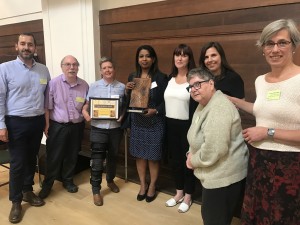
The team supported ‘Theresa’ [not her real name], a woman who had lived in the home for many years. She was close to her family, who visited often. Theresa had profound and multiple learning disabilities. She was well settled in the home, where staff knew her well. There was a skilled and experienced staff team, as well as some younger staff that were new to the role. The staff team were supported by CMG’s internal clinical team.
When Theresa’s health deteriorated, she had multiple hospital admissions. The decision to provide palliative care at home was made with everyone’s agreement, following the Mental Capacity Act. There was excellent involvement from the GP, the community palliative care team and CMG’s clinical team, which visited often. Her family visited every day.
The staff team was well supported. For example, the healthcare facilitator slept over at the house to support the night staff, in case Theresa died at night. One of the night staff was young and had never been exposed to death before, and was very grateful for this additional support.
The team were devastated when Theresa died, but were able to provide good support for the family and the other residents in the house. They have held a ‘memory’ service for Theresa and are developing a new sensory garden, which will include a memorial walk for her. A final remark from the team: “Theresa was a beautiful woman with an inner calm; she had a warm presence about her. People were drawn to her and enjoyed her company. She is sadly missed.”
The judges were moved by Theresa’s story. There were many aspects that impressed them: the obvious love and dedication of the team, enabling Theresa to shine; the understanding of her needs; the careful way in which end of life decisions were made; the way in which the managers supported the more junior team members around the period of Theresa’s dying; and not least the very sensitive support of the religious needs of Theresa and her family. She has clearly left an important legacy, and the team has enabled this. As one staff member summed up: “I’d have given anything not to be there that night [when Theresa died], but now I’m glad I was. If I have to go through that again, I won’t feel so anxious and will be more confident in dealing with it.”
HIGHLY COMMENDED
Matthew Picton’s Team: Lorna Campion and Paul Stenhouse
Nominated by: Sue and John Picton (Matthew’s parents)
In a nutshell: Wonderful support from two carers for Matthew Picton, enabling him to live a life full of joy up to the time he died.
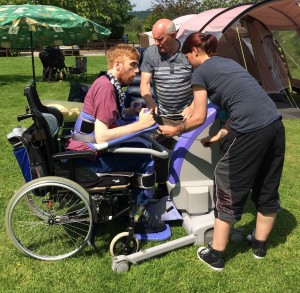
Matthew was born with a progressive condition affecting all the cells of his body, leading to multiple impairments. This did not stop him leading a full life. He had lived in his own home for almost two decades, remaining close to his parents and sister, enjoying holidays with them, as well as holidays with his carers. He particularly enjoyed camping and the outdoors. Matthew was diagnosed with an aggressive cancer in 2013. Following a formal Best Interest consultation, it was agreed that he would not cope with either radical surgery or chemotherapy, and the focus would be on maintaining a good quality of life. Many people were involved in his support: his GP, the care home managers, staff and ex-staff, the local hospice, the Catholic priest, but above all his key workers Paul and Lorna. They went out of their way to ensure that Matthew was happy, comfortable, surrounded by love, and able to enjoy what his parents described were “an extraordinary two years”. Highlights were wheelchair-accessible camping holiday, complete with hoist, PEG equipment, a ‘just-in-case’ medication box and access to 24/7 local district nurse intervention in case of a crisis. Matthew died peacefully at home, surrounded by people who loved him.
The judges agreed with Matthew’s parents, who said that “Paul and Lorna were absolutely amazing supports for Matthew with their energy, resourcefulness, calm love and sense of fun that made his end of life so special.” We are delighted to recognise their dedication and competence with a Highly Commended award.
